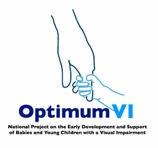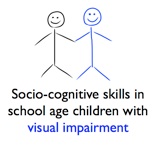Childhood visual disorders affecting vision are usually
diagnosed in the first year of life. Lack of vision or very low levels of
vision can affect all areas of general development and learning, such as
delaying reaching early milestones. The early years are therefore a very
important time for assisting and supporting the development of children with
visual impairment, in order to ensure the best possible progress in early
development. However there is still a great deal to be learned about the early
development of babies and young children with severe visual impairment and also
what kind of support for parents and babies or young children is most
beneficial. There are a number of different methods of early intervention and
support available for babies and young children with visual impairment and we
want to learn about which method may be the most helpful.
The Optimum VI Project is developed by the
Developmental Vision service of Great Ormond Street Hospital which is a clinical
service supporting infants and children with severe visual impairment, led by Prof Naomi Dale (Principal investigator) and Dr Alison Salt.
This research study aims to learn more about the early development of babies and young children with visual impairment, and also how different methods of early intervention and care might influence this early development.

